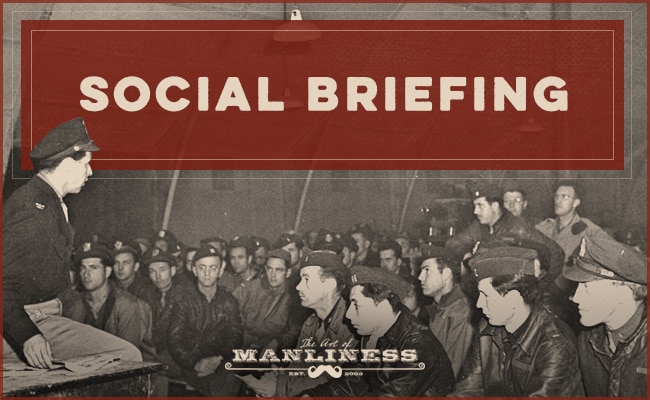
Social Briefings are short bi-monthly dispatches that offer practical tips to improve your social skills. Read more on their raison d’etre.
Initiating small talk with someone may be the hardest part of managing an interaction, but once you’ve taken those first few steps, your work isn’t yet done.
After exchanging a few pleasantries, your job is to nurture those first buds, lest they be struck with the freeze of awkward silence and die on the vine — killing a potential relationship before it’s even begun.
The best way to ensure your small talk grows into something more substantial is to ask the other person questions. And not just any questions: open-ended ones.
The ability to ask good open-ended questions isn’t just important for building small talk with new people, but also forging stronger connections with those you’re already close with. Maintaining your curiosity about friends and family ensures you continue to have deep, interesting conversations that keep your relationships fresh, satisfying, and strong.
So today we’ll talk about what makes open questions different from closed ones, and how to effectively deploy the former to build personal charisma and enhance your connections with others.
Open vs. Closed Questions
Closed questions are those which can be answered in a few words or less. They fish for facts, and are akin to multiple choice questions on a test.
Open questions, on the other hand, solicit the other person’s thoughts, feelings, and/or interests and can be answered in ways that are more diverse and expansive. They’re more like essay questions, and the genius of them is that they’re accordion-like in nature: rather than putting people on the spot, open-ended questions allow them to reveal more or less about themselves, depending on their comfort level.
As Alan Garner lists in Conversationally Speaking, open and closed questions tend to begin with different respective words:
Close-Ended
- Are?
- Do?
- Who?
- When?
- Where?
- Which?
Both
- What?
Open-Ended
- How?
- Why
- In what way?
One closed question fired right after another can make a conversation feel more like a shallow, stilted interview.
In contrast, open questions cause the responder to reflect and reveal a little more about themselves, which people generally enjoy doing. And because they demonstrate the asker’s curiosity and interest in the other person, the other person reciprocally becomes more interested in the asker. Plus, open-ended questions take the conversation deeper, which makes it a more satisfying experience for both parties.
How to Ask More Open-Ended Questions
It’s not that you should never ask closed questions. They’re sometimes necessary for soliciting specific information. And they’re typically how you begin a conversation in the first place: Where are you from? What do you do?
It’s once the other person responds to your initial closed questions that you begin to ask more open ones that seek to clarify and expand on the things they tell you. You can do that by taking the open-ended words listed above, and turning them into question-starting phrases like:
- What was it like to…
- What was the best part of…
- What was the hardest part about…
- How did you feel about…
- How did you know…
- What brought you to…
- What’s surprised you the most about…
- In what way is that similar/different from…
- Why do you want…
Let’s see how these question starters can be put to use. Below are some effective small talk chains, with the common, but less open-ended questions marked through, followed by a better alternative:
- Where are you from? →Did you live there all of your life? What was it like to grow up there? → What brought you here? → How many siblings do you have? Tell me more about your family. → Is it tough being away from them? → What do you miss most about your hometown?
- What are you majoring in? → Why did you decide to choose that major? → Are you liking it? What’s been the best class you’ve taken so far? → What was the most interesting part of the class?
- What do you do? →Do you like your job? → How did you know you wanted to go into that field? → How did you find your way into that specific position?
Know that it’s possible for questions to be too open-ended. Questions like “Tell me about yourself” are so broad as to confuse people on how to respond.
Other questions like “How was your weekend?” or “How’s it going?” are most often taken as rote rituals — polite greetings — rather than sincere questions seeking more than a one-word answer.
It’s okay to ask these kinds of “cliché” questions, but they almost always need to be coupled with a more open-ended follow-up:
- How was your weekend? What did you do?
- How was your day? What was the best part?
- How have you been? What’s been going well for you?
If the other person gives another abbreviated response, you can say something like, “What else? I really want to know.†People are used to going through the motions with folks, and are looking for permission to talk a little about themselves. But if they remain reticent, they may simply not want to chat, and you should respect that.
The beauty of open-ended questions is that one begets another; as people reveal more about themselves, they give you fodder about which to pose more questions. That’s one way to figure what to ask folks, and we’ll talk more about it and others next time.


